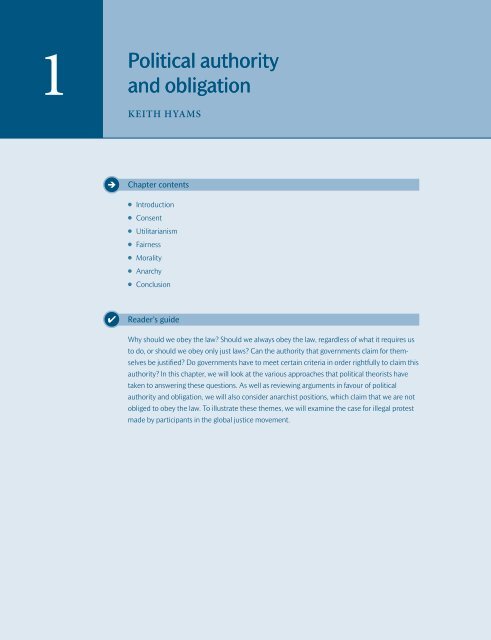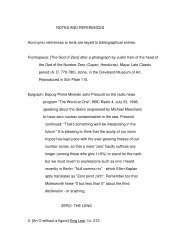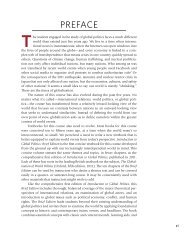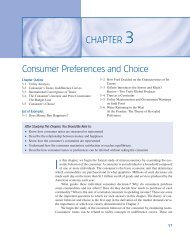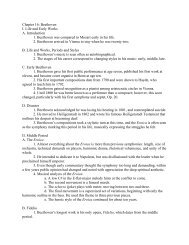1 Political authority and obligation Political authority and obligation
1 Political authority and obligation Political authority and obligation
1 Political authority and obligation Political authority and obligation
Create successful ePaper yourself
Turn your PDF publications into a flip-book with our unique Google optimized e-Paper software.
1<br />
<strong>Political</strong> <strong>authority</strong><br />
<strong>and</strong> <strong>obligation</strong><br />
KEITH HYAMS<br />
Chapter contents<br />
● Introduction<br />
● Consent<br />
● Utilitarianism<br />
● Fairness<br />
● Morality<br />
● Anarchy<br />
● Conclusion<br />
Reader’s guide<br />
Why should we obey the law? Should we always obey the law, regardless of what it requires us<br />
to do, or should we obey only just laws? Can the <strong>authority</strong> that governments claim for themselves<br />
be justified? Do governments have to meet certain criteria in order rightfully to claim this<br />
<strong>authority</strong>? In this chapter, we will look at the various approaches that political theorists have<br />
taken to answering these questions. As well as reviewing arguments in favour of political<br />
<strong>authority</strong> <strong>and</strong> <strong>obligation</strong>, we will also consider anarchist positions, which claim that we are not<br />
obliged to obey the law. To illustrate these themes, we will examine the case for illegal protest<br />
made by participants in the global justice movement.
10 Keith Hyams<br />
Introduction<br />
Th e starting point for many of the issues discussed in this book is the state. How should<br />
political representatives be chosen? How much should the state tax us <strong>and</strong> how should it<br />
spend that tax? When should the state go to war? How should the state control our borders?<br />
Before moving on to these questions in later chapters, one question suggests itself<br />
before all others: why should we have a state at all? Why should we, human beings born<br />
into a world that is ruled everywhere by this state or that, acquiesce in the power of those<br />
states? Why should we accept the <strong>authority</strong> that they claim for themselves <strong>and</strong> why should<br />
we obey their laws?<br />
Questions about political <strong>authority</strong> <strong>and</strong> <strong>obligation</strong> require us to delve into normative<br />
issues—issues about what we should do a nd about what principles we should follow. In<br />
order to justify political <strong>authority</strong> <strong>and</strong> <strong>obligation</strong>, we need to identify normative principles<br />
that can ground our case. But we also need to address descriptive issues—issues that are<br />
about how the world is or how the world would be if something were to happen. We need<br />
to know whether obeying the laws set <strong>and</strong> enforced by our governments would be the best<br />
way in which to follow the normative principles that we identify. Consider, for example,<br />
the claim that we should obey the law because, if we do not do so, then society will collapse<br />
into chaos. Th is claim implies an argument with two premises:<br />
● a normative premise, which says that we have a d uty not to let s ociety collapse into<br />
chaos; <strong>and</strong><br />
● a descriptive premise, which says that, if w e do no t obey the law, then society will<br />
collapse into chaos.<br />
KEY CONCEPTS<br />
Authority<br />
To have <strong>authority</strong> in the practical sense is not merely to have power over someone. To have<br />
power over someone is to have at one’s disposal the means to make that person do something—but<br />
<strong>authority</strong> requires something more: that the person subject to the <strong>authority</strong> have a<br />
certain ‘pro’ attitude towards the person or institution that claims <strong>authority</strong>. Authoritative directives<br />
are obeyed not because those who obey them are fearful of punishment, but because<br />
those who obey them think that the directives should be obeyed by virtue of their issuing from<br />
the <strong>authority</strong>.<br />
Together, these two premises entail the conclusion that we have a duty to obey the law. In<br />
order to challenge this conclusion, people might question either the normative premise or the<br />
descriptive premise. They might ask normative questions: do we really have a duty not to let society<br />
collapse? Why should I believe that we have such a duty? Or they might ask descriptive<br />
questions: why will society collapse if I do not obey the law? Are there no other ways in which<br />
we could prevent society from collapsing other than by obeying the law? Might we not, for<br />
example, set up anarchist self-governing federations instead?
<strong>Political</strong> <strong>authority</strong> <strong>and</strong> <strong>obligation</strong> 11<br />
Th e following sections will discuss various arguments in support of the claim that we have<br />
a duty to obey the law. In order to assess these arguments, you should try to work out on<br />
what normative <strong>and</strong> descriptive premises they rely, <strong>and</strong> how plausible you think those<br />
premises are.<br />
Consent<br />
By far the most widely discussed justifi cation for political <strong>authority</strong> <strong>and</strong> <strong>obligation</strong> is what<br />
is o ft en called consent theory (o r contract theory). C onsent t heorists c laim t hat w e<br />
should obey the law because we have consented to do so. Consent theory is a type of voluntarism,<br />
because it says that our <strong>obligation</strong> to obey the law derives from a v oluntary<br />
undertaking on our part.<br />
Consent theory is oft en associated with the seventeenth-century English philosophers<br />
Th omas Hobbes <strong>and</strong> John Locke, <strong>and</strong> with the eighteenth-century French philosopher<br />
Jean-Jacques Rousseau. But the thought that we have consented to obey the law was fi rst<br />
given currency by the Greek philosopher Plato, in his dialogue ‘Crito’ (360 bc; 1892). Plato<br />
recounts how Socrates was condemned to death by an Athenian court for corrupting the<br />
minds of the youth with his ideas. Whereas Socrates’ friends urge him to escape, Socrates<br />
himself refuses to fl ee <strong>and</strong> stays to drink the fatal hemlock. Socrates argues, among other<br />
things, t hat his lo ng residence in A thens constitutes an agreement to ob ey t he laws of<br />
Athens. By living in Athens he has, in o ther words, consented to obey the law. He must<br />
therefore respect the court’s verdict <strong>and</strong> submit to his execution.<br />
KEY CONCEPTS<br />
Consent<br />
When someone consents to something, he or she either takes on a duty to do a particular<br />
thing or permits others to do a particular thing. Consent is important not only to politics, but<br />
also to a whole range of contexts. We talk, for example, about whether sex was consensual,<br />
about consenting to some medical treatment, <strong>and</strong> so on. As Hurd writes (1996: 123): ‘Consent<br />
turns a trespass into a dinner party; a battery into a h<strong>and</strong>shake; a theft into a gift; an invasion<br />
of privacy into an intimate moment; a commercial appropriation of name <strong>and</strong> likeness into a<br />
biography.’<br />
Consent theorists make two claims. First, they claim that, by consenting to obey the law,<br />
each of us can impose on ourselves an <strong>obligation</strong> to obey the law. Second, they claim that<br />
we have, in fac t, consented to obey the law. Th e fi rst of these claims has g enerally been<br />
regarded as uncontroversial; it is the second claim that has provoked one of the liveliest<br />
<strong>and</strong> most enduring debates in the history of political thought. As the eighteenth-century<br />
Scottish philosopher David Hume wrote:
12 Keith Hyams<br />
My intention here is not to exclude the consent of the people from being one just foundation<br />
of government where it has place. It is surely the best <strong>and</strong> most sacred of any. I only<br />
pretend, that it has very seldom had place in any degree, <strong>and</strong> never almost in its full extent.<br />
(1748; 1947: 219)<br />
What, then, about the consent theorist’s claim that we have consented to obey the law?<br />
When are we supposed to have consented? How did we consent? To whom did we consent?<br />
With the possible exception of new immigrants to certain countries, few of us will e ver<br />
have said or written anything explicitly stating that we hereby consent to obey the law. So<br />
on what basis do consent theorists claim that we have consented to obey the law?<br />
Tacit consent<br />
Modern co nsent t heorists f ollow L ocke (1690; 1924) in makin g a distinc tion b etween<br />
express consent (also sometimes called explicit consent or active consent) <strong>and</strong> tacit consent<br />
(also sometimes called implicit consent or passive consent). Express consent is the<br />
type of consent that we give when we expressly announce—in speech or in writing—that<br />
we consent to something. Tacit consent, on the other h<strong>and</strong>, refers to more subtle forms of<br />
consenting within which no express announcement is made. Consent theorists argue that<br />
the fact that most of us have never said or written anything indicating our consent to obey<br />
the law shows only that we have not expressly consented to obey the law; it does not show<br />
that we have not tacitly consented to obey the law. Furthermore, they argue, we have tacitly<br />
consented to obey the law, by doing things such as v oting in elec tions <strong>and</strong> even just by<br />
residing in a particular geographical territory.<br />
Considerable confusion surrounds the distinction between express consent <strong>and</strong> tacit<br />
consent. Th at express consent is exemplifi ed by acts such as uttering a statement of consent<br />
or signing a do cument is clear enough; what is not clear, however, is w hat such acts are<br />
supposed to exemplify <strong>and</strong> to what type of acts they are opposed. Th e distinction most<br />
oft en appealed to in this connection is a distinction between consent by action <strong>and</strong> consent<br />
by omission: express consent means consent by doing something, whereas tacit consent<br />
BOX 1.1 THE CASE OF WEST PAPUA<br />
What would it take for an entire population expressly to consent to be governed by a particular<br />
government? According to the Indonesian government, the population of West Papua—the<br />
western half of the isl<strong>and</strong> that also includes Papua New Guinea—consented to its <strong>authority</strong> in<br />
1969, the date of an event that it calls the ‘Act of Free Choice’. West Papuan independence<br />
activists claim, on the other h<strong>and</strong>, that the act involved only a h<strong>and</strong>ful of tribal leaders who had<br />
been coerced into signing a document in which they supposedly agreed to the <strong>authority</strong> of the<br />
Indonesian government over West Papua. The West Papuan activists further claim that this<br />
coerced act of consent continues to be used as a pretext for an unjustified military occupation of<br />
their country that has seen widespread human rights abuses <strong>and</strong> genocidal tactics used against<br />
the indigenous Papuan population.
<strong>Political</strong> <strong>authority</strong> <strong>and</strong> <strong>obligation</strong> 13<br />
means consent by not doing something. On this interpretation, an example of tacit consent<br />
would be remaining silent when the chair of a meetin g announces that all w ho do no t<br />
speak up at a particular time will be deemed to have consented to a particular proposal.<br />
Th e obvious problem with this interpretation is that at least one of the acts that consent<br />
theorists claim is tacit consent to obey the law—voting—is an act, rather than an omission.<br />
Th us, although the distinction between consent by action <strong>and</strong> consent by omission might<br />
help to illuminate the variety of ways in which consent can be given, it is not particularly<br />
relevant to arguments for consent theory.<br />
In order to unlock the distinction that is relevant to these arguments, consider the types<br />
of act that count as express consent: saying, ‘I consent to X’, signing a document, etc. Th es e<br />
are all fairly trivial acts that serve no particularly useful purpose other than in their role as<br />
consent. If these acts were not to count as co nsent, there would rarely be any reason to<br />
perform them—<strong>and</strong> there is a good reason for this. Suppose that acts of express consent<br />
could include useful acts such as eating, playing football, breathing, <strong>and</strong> telling someone<br />
one’s name—acts that we might well have a reason to perform other than in order to consent.<br />
In such a scenario, we would end up consenting to things not because we wanted to<br />
consent, but because we could not avoid consenting in order to eat, play football, etc.—or<br />
we would have to refrain from performing these useful acts in order to avoid consenting.<br />
If, on the other h<strong>and</strong>, only acts with no useful role are selected to serve as acts of express<br />
consent, then we do not have to avoid performing useful acts in order to avoid consenting.<br />
With this restriction in place, we can be sure that when someone performs an act of consent,<br />
he or she does so because he or she wants to consent <strong>and</strong> not merely because he or she<br />
wants to perform that act.<br />
Th e problem for consent theorists is that the two acts that they want to say are acts of<br />
consent to obey the law—voting <strong>and</strong> residing—are both useful acts. As such, they cannot<br />
count as ac ts of express consent without running into the problem just discussed. Tacit<br />
consent provides a way out, however, because acts of tacit consent can be useful acts. But<br />
(<strong>and</strong> it is a big ‘but’) not just any acts can qualify as tacit consent. An act can only qualify<br />
as tacit consent if it would normally be prohibited to the person who consents, because<br />
someone has a right that they not perform the act without thereby consenting. Th e right<br />
holder grants an exemption from the prohibition only on condition that, when the act is<br />
performed, consent is a utomatically given. S o, for example, a c ustomer in a r estaurant<br />
tacitly consents to pay for his or her meal by eating the meal. Unless eating the meal counts<br />
as consent to pay for the meal, then he or she should not have eaten it. Th e dish belongs to<br />
the owner of t he restaurant <strong>and</strong> he o r she has a mo ral r ight t hat, unless t he c ustomer<br />
thereby consents to pay for the meal, he or she should not eat it.<br />
Why the requirement that acts of tacit consent must be acts that would be prohibited<br />
unless specifi ed as consent? Because this requirement allows us to get around the problem<br />
that arises, as we saw above, with useful acts counting as consent. Acts of tacit consent are<br />
acts that the person who consents would not have been permitted to perform anyway, had<br />
the act not been specifi ed as consent. As such, he or she has nothing to lose by that act’s<br />
being specifi ed as an act of consent. Th e customer at the restaurant, for example, does not<br />
lose out if eating a meal at the restaurant counts as tacit consent to pay for the meal. Had<br />
the customer not been permitted to eat the meal as an act of tacit consent, he or she would<br />
not have been permitted to eat the meal at all.
14 Keith Hyams<br />
In order to determine whether residing <strong>and</strong> voting can count as tacit consent to obey the<br />
law, it is therefore important to ask whether these things would otherwise be prohibited to<br />
us because the state has a moral right that we not do these things without thereby consenting.<br />
If the state does not have such a right, then it cannot treat our doing these things as<br />
consent to obey the law.<br />
A second important question that we must ask in o rder to determine whether these<br />
supposed acts of consent succeed in p lacing us under a d uty to obey the law is: was t he<br />
consent given f reely? Or ra ther: was t he consent given freely e nough to be eff ective in<br />
placing us under a duty to obey the law? Th eo rists diff er in their views about just how freely<br />
consent needs to be given in order to be eff ective. At the very least, most theorists agree<br />
that coerced consent—that is, co nsent performed under t hreat of harm—is ineff ective.<br />
Suppose, for example, that you are mugged in the street. Th e mugger holds a gun to your<br />
head <strong>and</strong> tells you that if you do not h<strong>and</strong> over your wristwatch, he will sho ot you. You<br />
might consent to h<strong>and</strong> over your wristwatch, but your consent is ineff ective. You do not<br />
give the thief any right to keep the wristwatch. Th e wristwatch remains yours <strong>and</strong> you are<br />
entitled to try to reclaim it.<br />
Residence as consent<br />
Both Plato <strong>and</strong> Locke claim that residence in a particular geographical territory counts as<br />
consent to obey the laws of that territory. (Locke claims that even travelling through a<br />
geographical territory counts as co nsent to obey its laws.) To some readers, this might<br />
seem to be an entirely natural claim: if we do not like the laws of the country in which we<br />
live, then we are free to leave <strong>and</strong> live elsewhere. If we choose to stay, then we have consented<br />
to obey the laws of that country. But are we really free enough to leave for our continued<br />
residence to count as eff ective consent? Even if we set aside those states that forcibly<br />
prevent their citizens from leaving, many of us would have to leave behind our friends,<br />
family, culture, <strong>and</strong> work, etc. in o rder to move elsewhere. So you might well question<br />
whether, if w e choose not to make t hese s acrifi ces, our continued residence can really<br />
count as free <strong>and</strong> eff ective consent. Hume (1748; 1947) famously argued that our residence<br />
in a territory no more counts as eff ective consent than does the presence on board a ship<br />
of a man who was carried on board while asleep. Rousseau (1762; 1968), on the other h<strong>and</strong>,<br />
insists that when the state does not impede our exit, then our continued residence is free<br />
enough to count as eff ective consent. But he accepts that when we are forced to stay in a<br />
country by a coercive state, our residence does not count as eff ective consent.<br />
Th at is one reason why some theorists have questioned whether residence in a country<br />
can count as consent to its laws. Another reason appeals to the thought that, as w e saw<br />
above, the state can only treat our residence as tacit consent to obey the law if it has a moral<br />
right that we not reside in the country without thereby consenting. It is not easy to see why<br />
the state would have a right that we not live within its borders unless we consent to obey its<br />
laws. Many people own the l<strong>and</strong> on which they live <strong>and</strong> seem therefore to have a prima<br />
facie right to live on that l<strong>and</strong> without submitting to anyone’s rules. We cannot simply<br />
assume that the government, as t he <strong>authority</strong> that presides over the l<strong>and</strong>, has a r ight to<br />
determine who can live within its borders. To do so would beg the very question that we<br />
wish to answer: why should we regard the <strong>authority</strong> that the government claims for itself as
<strong>Political</strong> <strong>authority</strong> <strong>and</strong> <strong>obligation</strong> 15<br />
BOX 1.2 PLATO, LOCKE, HUME, AND ROUSSEAU ON RESIDENCE AS CONSENT<br />
And if any one of you wishes to go to a colony, if he is not satisfied with us <strong>and</strong> the city, or to<br />
migrate <strong>and</strong> settle in another country, none of us, the laws, hinder or forbid him going whithersoever<br />
he pleases, taking with him all his property. But whoever continues with us after he has<br />
seen the manner in which we administer justice, <strong>and</strong> in other respects govern the city, we now<br />
say, that he has in fact entered into a compact with us, to do what we order.<br />
(Plato, 360 BC; 1892: 41)<br />
Every man that hath any possession or enjoyment of any part of the dominions of any government<br />
doth hereby give his tacit consent, <strong>and</strong> is as far forth obliged to obedience to the laws of<br />
that government, during such enjoyment, as any one under it, whether this his possession be of<br />
l<strong>and</strong> to him <strong>and</strong> his heirs for ever, or a lodging only for a week; or whether it be barely travelling<br />
freely on the highway; <strong>and</strong>, in effect, it reaches as far as the very being of any one within the territories<br />
of that government.<br />
(Locke, 1690; 1924: 177)<br />
Can we seriously say that a poor peasant or artisan has a free choice to leave his country, when<br />
he knows no foreign language or manners, <strong>and</strong> lives, from day to day, by the small wages which<br />
he acquires? We may as well assert that a man, by remaining in a vessel, freely consents to the<br />
dominion of the master; though he was carried on board while asleep, <strong>and</strong> must leap into the<br />
ocean, <strong>and</strong> perish, the moment he leaves her.<br />
(Hume, 1748; 1947: 221–2)<br />
After the state is instituted, residence implies consent; to inhabit the territory is to submit to the<br />
sovereign. [Footnote:] This should always be understood to refer only to free states, for elsewhere<br />
family, property, lack of asylum, necessity or violence may keep an inhabitant in the<br />
country unwillingly, <strong>and</strong> then his mere residence no longer implies consent either to the contract<br />
or to the violation of the contract.<br />
(Rousseau, 1762; 1968: 153)<br />
legitimate? It looks, then, as though the residence version of consent theory cannot succeed<br />
without relying on some prior justifi cation for political <strong>authority</strong> that does not appeal<br />
to tacit consent. If such a justifi cation can be found, then political <strong>authority</strong> will already<br />
have been shown to be legitimate <strong>and</strong> consent then becomes redundant.<br />
Voting as consent<br />
A second act that some consent theorists have argued is tacit consent to obey the law is<br />
voting in a democratic election. John Plamenatz, for example, writes that ‘where there is<br />
an established process of election to an offi ce, then, provided the election is free, anyone who<br />
takes part in the process consents to the <strong>authority</strong> of whoever is elected to the offi ce’ (1968:<br />
170). Of course, not everyone in the world has the opportunity to vote in a democratic<br />
election, <strong>and</strong> even among those who do, many choose not to exercise it. But can we at<br />
least say that citizens of democratic states who do cast their vote have freely consented<br />
to obey the law?
16 Keith Hyams<br />
Recall again the requirement that the state can treat an act as an act of tacit consent only<br />
if it has a moral right that we not perform the act without thereby consenting. Th is requirement<br />
seems to pose less of a problem for the voting version of consent theory than it did<br />
for the residence version. Th e state sets up <strong>and</strong> runs elections for the benefi t of those who<br />
participate in them, using its own ballot boxes <strong>and</strong> voting slips. As such, it seems plausible<br />
that the state does have a right that people not vote if they do not thereby consent to obey<br />
the law.<br />
Now recall the requirement that consent must be free <strong>and</strong> uncoerced in order to be effective.<br />
Th e voting version of consent theory seems to face even bigger problems than the<br />
residence version faced in this respect. Th e problem is that whether or not we choose to<br />
vote, we will all b e forced to obey the law anyway. We do no t really have the choice to<br />
abstain from the political <strong>and</strong> legal arrangements of our country altogether. As such, some<br />
who would prefer to opt out altogether if they were able will choose to vote nevertheless.<br />
Th ey will reason that if they are going to be forced to obey the law regardless, they might<br />
as well at least be forced to obey the laws of the party that they least dislike.<br />
Is a v ote cast under suc h circumstances free <strong>and</strong> uncoerced? Consider the following<br />
analogy: a man holds a gun to your head <strong>and</strong> dem<strong>and</strong>s either your wallet or your wristwatch.<br />
You would prefer to keep both your wallet <strong>and</strong> your wristwatch, but because you do<br />
not have that option, you choose to give him your wristwatch. Did you freely consent to<br />
give away your wristwatch? Th at seems unlikely. You simply chose the lesser of two evils,<br />
<strong>and</strong> there is a str ong case for treating your consent as co erced <strong>and</strong> therefore ineff ective.<br />
Likewise, when the state gives us a choice between being governed by this party or that, we<br />
may choose the least worst option by voting for the party that we least dislike. But if such a<br />
vote counts as consent, then it is, like the giving of the wristwatch, coerced consent. And as<br />
we saw above, whatever theorists may think about the infl uence of other forms of unfreedom<br />
on consent, everyone agrees that coerced consent is ineff ective. In short, then,<br />
voting cannot count as eff ective consent to obey the law, at least until those who do not<br />
vote are permitted to disobey the law.<br />
Hypothetical consent<br />
Perhaps in contemplation of the problems that beset attempts to show that we have consented<br />
to obey the law, some thinkers, from Hobbes (1651; 1996) onwards, have adopted<br />
the alternative claim that we would, if the state did not already exist, set up a state <strong>and</strong> consent<br />
to obey its laws. Th is is sometimes called hypothetical consent (or a h ypothetical<br />
contract)—consent that we would give in an imagined situation that does not match reality.<br />
A key challenge for hypothetical consent theorists is t o show why it matters what we<br />
would do rather than what we have, in fact, done. It is easy to see why our actual consent to<br />
obey the law should bind us to the law, but why should our hypothetical consent bind us to<br />
the law? Th e worry, as Ronald Dworkin puts it, is that ‘a hypothetical contract is not simply<br />
a pale form of an actual contract; it is no contract at all’ (1977: 151).<br />
Hypothetical consent theorists have tried to respond to this challenge in a n umber of<br />
diff erent ways. Central to these responses is oft en the claim that, by looking at hypothetical<br />
consent, we can determine what it would be rational for us t o agree to, even if w e were<br />
purely self-seeking (for example, Hobbes, 1651; 1996; Gauthier, 1986). But again, one might
<strong>Political</strong> <strong>authority</strong> <strong>and</strong> <strong>obligation</strong> 17<br />
reasonably challenge the hypothetical consent theorist to explain why we should care what<br />
it would be rational for us to do, when, in reality, we might prefer to act irrationally. If the<br />
hypothetical consent theorist replies along the lines of, ‘Because it is in your best interests<br />
to do what it is rational to do’, then it looks like his or her argument for political <strong>authority</strong><br />
<strong>and</strong> <strong>obligation</strong> appeals to the benefi ts that the state brings, rather than on the moral importance<br />
of consent. But if the hypothetical consent theorist’s argument relies ultimately on the<br />
benefi ts that the state brings, then the hypothetical consent seems to drop out of the picture—that<br />
is, we might as well seek to justify political <strong>obligation</strong> <strong>and</strong> <strong>authority</strong> by direct<br />
reference to the benefi ts that the state brings. In the next section, we will look at precisely<br />
this possibility.<br />
KEY POINTS<br />
● Consent theorists claim that we should obey the law, because we have consented to do so.<br />
● Modern consent theorists rely on the Lockean notion of tacit consent. Tacit consent has been<br />
interpreted in different ways, but is most usefully interpreted as consent by doing something<br />
that you would not otherwise be permitted to do, because someone has a right that you not<br />
do that thing without thereby consenting.<br />
● Some consent theorists argue that residence in a geographical territory counts as tacit consent<br />
to obey the law. One objection to this claim says that we are not free enough to leave our<br />
country of birth for our residence to count as effective consent. Another objection suggests<br />
that residing on one’s own l<strong>and</strong> is not a prohibited act <strong>and</strong> cannot therefore count as tacit<br />
consent.<br />
● Some consent theorists argue that voting in a democratic election counts as tacit consent<br />
to obey the law. But as long as those who do not vote are forced to obey the law despite<br />
their abstention, it seems reasonable to treat voting as coerced, <strong>and</strong> therefore ineffective,<br />
consent.<br />
● Hypothetical consent theorists argue that we would consent to set up a state <strong>and</strong> obey the<br />
law if the state did not already exist. The diffi culty for hypothetical consent theorists is to<br />
explain why it should matter morally what we would do, rather than what we have, in fact,<br />
done.<br />
Utilitarianism<br />
One reason to think that we should obey the law regardless of the presence or absence of<br />
consent is that obedience to the law allows the state to exist <strong>and</strong> that the existence of the<br />
state brings many benefi ts. We have roads down which to drive, police to keep the peace<br />
within our borders, <strong>and</strong> armies to protect our borders. Some of us a re lucky enough to<br />
enjoy access to free or heavily subsidized health care <strong>and</strong> education. Are these benefi ts not<br />
themselves suffi cient justifi cation for political <strong>authority</strong> <strong>and</strong> <strong>obligation</strong>?<br />
Th e answer to this question is both ‘yes’ <strong>and</strong> ‘no’. For those who want to act in ways that<br />
benefi t society, the benefi ts that the state brings will provide a reason to obey the law. But
18 Keith Hyams<br />
those who are less motivated to benefi t society, or those who want to reap the benefi ts of<br />
others’ obedience without paying the cost, will not regard the benefi ts that the state brings<br />
as a reason for them to obey the law. If we want to show that everyone has a duty to obey the<br />
law, then we must show not only that obedience to the law, by permitting the state to exist,<br />
benefi ts society. We must also show that everyone has a d uty to act in wa ys that benefi t<br />
society.<br />
Th e moral theory best placed to ground the claim that everyone has a duty to act in ways<br />
that benefi t society is utilitarianism. First proposed by Jeremy Bentham in the late eighteenth<br />
century, utilitarianism says that everything that we do should aim to maximize the<br />
amount of pleasure <strong>and</strong> minimize t he amount of pain in t he world. It does not matter<br />
whose pleasure or pain is at stake: what is important is the overall aggregated balance of<br />
pleasure over pain across e veryone. Whenever we have a c hoice about how to ac t, we<br />
should always choose the option that best fulfi ls this aim.<br />
One objection immediately arises to any attempt to use utilitarianism as grounding for<br />
political <strong>authority</strong> <strong>and</strong> <strong>obligation</strong>. If someone is deciding whether to obey or to break the<br />
law on a particular occasion, then surely, according to utilitarianism, he or she ought choose<br />
whichever option would maximize the amount of pleasure in the world <strong>and</strong> minimize the<br />
amount of pain. Whether that option is wi thin the law or outside the law is ir relevant,<br />
except in so far as any punishment that illegal actions might attract should be factored into<br />
the person’s calculations.<br />
But perhaps a more sophisticated version of utilitarianism can meet this objection. Bentham’s<br />
version of utilitarianism—sometimes called act utilitarianism—judges individual<br />
actions directly against the utilitarian requirement to maximize p leasure <strong>and</strong> minimize<br />
pain. In contrast, a more sophisticated version—sometimes called rule utilitarianism—<br />
introduces two stages, as follows.<br />
1. Potential rules are judged against the utilitarian requirement to maximize pleasure<br />
<strong>and</strong> minimize pain, <strong>and</strong> the best rules are chosen accordingly.<br />
2. Individual actions are judged right or wrong against these rules, regardless of how<br />
each action performs in terms of its direct infl uence on the amount of pleasure <strong>and</strong><br />
pain in the world.<br />
If we adopt rule utilitarianism rather than act utilitarianism, then it is easier to see how we<br />
might construct a utilitarian case for political <strong>authority</strong> <strong>and</strong> <strong>obligation</strong>. Th e benefi ts that<br />
obedience to the law <strong>and</strong> the existence of the state bring would be conducive to the promotion<br />
of pleasure <strong>and</strong> the reduction of pain. As such, it seems quite plausible that a rule requiring<br />
obedience to the law would be among those rules most likely to maximize pleasure<br />
<strong>and</strong> minimize pain. Th is would be true only if the laws of the state in question were suitably<br />
designed—but then a rule utilitarian would also argue that the laws themselves should be<br />
chosen by utilitarian criteria.<br />
Th e problem with the utilitarian justifi cation for political <strong>authority</strong> <strong>and</strong> <strong>obligation</strong> is that<br />
it is only as strong as the utilitarian moral theory itself. While utilitarianism does still have<br />
its supporters, most theorists now tend to regard utilitarianism as (at best) an incomplete<br />
theory of morality. In deciding how to act, we should take into account not only the likely<br />
consequences of an action, but also considerations such as rights <strong>and</strong> justice. We should do
<strong>Political</strong> <strong>authority</strong> <strong>and</strong> <strong>obligation</strong> 19<br />
so even when these other considerations dem<strong>and</strong> that we act in ways that would not maximize<br />
pleasure <strong>and</strong> minimize pa in. For example, we could imagine a si tuation in w hich<br />
utilitarianism required us t o punish an innocent person, pretending that he o r she had<br />
committed a crime when, in fact, he or she had not done so. By making an example of the<br />
innocent person, we might deter would-be criminals from causing greater pain in the long<br />
run. But most of us would think it wrong in any circumstances to punish an innocent person<br />
for a crime that he or she has not committed: innocent people have a right to liberty<br />
<strong>and</strong> we should not infringe that right. If utilitarianism requires us s ometimes to punish<br />
innocent people, then utilitarianism cannot be the whole story. Note also that we would<br />
think that innocent people should not be punished even if adopting a rule prohibiting their<br />
punishment were not conducive to the maximization of pleasure <strong>and</strong> the minimization of<br />
pain. Hence, the problem st<strong>and</strong>s for both act <strong>and</strong> rule utilitarianism.<br />
KEY POINTS<br />
● Utilitarianism is a moral theory that says that everything we do should aim to maximize the<br />
amount of pleasure <strong>and</strong> minimize the amount of pain in the world.<br />
● Some theorists have tried to ground a case for political <strong>authority</strong> <strong>and</strong> <strong>obligation</strong> in utilitarianism,<br />
appealing to the benefi ts to society of obedience to the state.<br />
● Most theorists now see utilitarianism as an incomplete account of morality. It may require us<br />
to do things that confl ict with our intuitive moral judgements about justice <strong>and</strong> rights, such as<br />
punishing innocent people for crimes they have not committed. Even rule utilitarianism fails<br />
to explain correctly why we think that such acts should be prohibited.<br />
Fairness<br />
You might think that utilitarian defences of political <strong>authority</strong> <strong>and</strong> <strong>obligation</strong> misconstrue<br />
the relevance of the benefi ts that the state brings. Perhaps we should not look forward to<br />
the future benefi ts that obedience to the law would bring to society in general, but back<br />
to the benefi ts that each of us have already received from the state: can these benefi ts justify<br />
a case for obedience to the law?<br />
Th e theorist H. L. A. Hart argues that if we accept a benefi t, then it is only fair that we<br />
should reciprocate <strong>and</strong> give something back. In this case, if w e enjoy the protection of<br />
police <strong>and</strong> armies, if we use roads, hospitals, schools, <strong>and</strong> other government-run services,<br />
then we should reciprocate by obeying the law. Not to do so would be to freeride unfairly<br />
on the eff orts of others.<br />
[W]hen a n umber of persons conduct any joint enterprise according to rules <strong>and</strong> thus<br />
restrict their liberty, those who have submitted to these restrictions when required have a<br />
right to a similar submission from those who have benefi ted by their submission.<br />
(Hart, 1955: 185)
20 Keith Hyams<br />
In other words, those who have willingly sacrifi ced their liberty in order to make possible<br />
the benefi ts provided by the state have a right to expect that the rest of us, who also receive<br />
these benefi ts, do the same.<br />
An important objection to this view, fi rst put by Nozick (1974: 90–5), denies that we can<br />
become duty-bound to reciprocate for benefi ts that we have not requested. Suppose that<br />
any group could place you under an enforceable <strong>obligation</strong> to take part in its project, simply<br />
by foisting benefi ts on you regardless of how much you want those benefi ts. Th is would,<br />
Nozick argues, unfairly curtail your freedom to choose in which projects to involve yourself<br />
so as best to promote those ends that you deem worth promoting.<br />
Nozick gives the example of a neighbourhood in which some people decide to start an<br />
entertainment programme over a public address system. Th e initiators of the programme<br />
draw up a list of everyone in the neighbourhood, which includes you, <strong>and</strong> assign everyone<br />
a day during the year on which each person is to run the programme. No one except the<br />
organizers is asked whether they want to participate, but everyone in the neighbourhood<br />
hears t he b roadcasts. W hen y our da y co mes, ha ving en joyed t he en tertainment p rogramme<br />
thus far, the organizers expect you to run the programme for the day. Nozick<br />
argues that this is unfair <strong>and</strong> that you have no duty to show up. All of the pleasure that you<br />
derived from the broadcasts over the past year might still not be worth the pleasure that<br />
you would derive by spending the day doing something else. No one other than you has a<br />
right to decide how you should use your time <strong>and</strong> resources to best promote the ends that<br />
you deem worth promoting.<br />
KEY POINTS<br />
● Hart argues that we have a duty of fairness to obey the law in return for the benefi ts that we<br />
have received from the state, made possible by our fellow citizens’ obedience to the law.<br />
● Nozick rejects the appeal to fairness, arguing that people should not be forced to participate<br />
in joint projects, when they may prefer to use their time <strong>and</strong> resources in other ways.<br />
Morality<br />
Th ink about the law for a moment <strong>and</strong> about some of the things that it requires us to do.<br />
Th e law forbids us to steal, to murder, to rape, <strong>and</strong> to do a n umber of other things that<br />
most of us would not dream of doing anyway, even if the law were not to exist. So it looks<br />
as though much of the law simply tells us to do, or not to do, things that we already think<br />
we should or should not do o ut of an independent sense of right <strong>and</strong> wrong. Perhaps,<br />
then, our duty to obey the law amounts to nothing more than a duty to obey the rules of<br />
morality, which distinguish right from wrong. We do not need to consent to these rules in<br />
order to be bound by them, because we cannot opt in or out of the dem<strong>and</strong>s of morality.<br />
One thing that will be immediately apparent is that this argument requires obedience<br />
only to just laws. Th e citizens of Nazi Germany or present-day Burma, for example, would
See chapter 7<br />
<strong>Political</strong> <strong>authority</strong> <strong>and</strong> <strong>obligation</strong> 21<br />
not be required to obey the oppressive laws imposed by their governments. But even liberal<br />
democracies tend to do a lot more than only enforce the basic rules of morality. Th ey<br />
also tend to tax people, tell people on what side of the road to drive, steer the economy in<br />
favour of particular outcomes, <strong>and</strong> require us to do a number of other things that are prima<br />
facie unrelated to morality. Quite which of these activities do fall beyond the remit of morality<br />
depends on what the rules of morality are. For example, disagreements about the roles<br />
of justice <strong>and</strong> equality in morality have implications for the permissibility of redistributive<br />
taxation. But however wide or narrow one’s conception of morality, most t heorists have<br />
tended to argue that morality alone cannot justify the <strong>authority</strong> that existing states claim<br />
for themselves.<br />
The minimal state<br />
One theorist who has famously argued for a particularly narrow conception of morality—<br />
a libertarian conception of morality—is Robert Nozick. In common with other libertarian<br />
theorists, but in confl ict with other schools of political theory, Nozick (1974) argues<br />
that justice prohibits redistributive taxation that is aimed at promoting equality. Any government<br />
t hat enf orces suc h t axation do es s o unjustly a nd illegitimately. According t o<br />
Nozick, all t hat morality permits the state to do is t o enforce basic p roperty rights <strong>and</strong><br />
rights against harm. A state that restricted itself to enforcing only these rights would be<br />
legitimate, but quite diff erent from the states that currently exist. Nozick calls his imagined<br />
state a minimal state.<br />
A Nozickean minimal st ate may legitimately enf orce r ights. B ut st ates do no t only<br />
claim for themselves the <strong>authority</strong> to enforce rights; they also claim for themselves the<br />
<strong>authority</strong> uniquely to enforce rights <strong>and</strong> to arbitrate in disputed cases. States do not permit<br />
private police forces to run parallel systems of enforcement, with private courts <strong>and</strong><br />
private prisons that are outside of the state’s control. Can morality justify this <strong>authority</strong>—<br />
the <strong>authority</strong> of states not only to enforce rights, but uniquely to enforce rights? In Pt 1 of<br />
Anarchy, State, <strong>and</strong> Utopia (1974), Nozick argues that the state may indeed ac t as t he<br />
unique enforcer of rights, prohibiting would-be private enforcers from setting up their<br />
own indep endent syst ems o f enf orcement. H is argument hin ges o n t he r isk t hat is<br />
involved in enforcing rights. Because law courts will sometimes make the wrong decision<br />
<strong>and</strong> co nvict inno cent p eople, enf orcement is a n inher ently r isky b usiness. Th e state,<br />
Nozick argues, is entitled to stop would-be private enforcers from taking this risk with<br />
other people’s lives, provided that the state itself enforces the rights of those who are disadvantaged<br />
by this prohibition.<br />
Nozick’s argument is ingenious <strong>and</strong> persuasive. But even if it succeeds, Nozick’s argument<br />
shows only that people should obey the law in so far as the law matches morality, <strong>and</strong><br />
that the state may uniquely enforce the law in so far as, by doing so, it enforces morality.<br />
Nozick’s argument cannot show that the state has any particular reason to expect its citizens<br />
to obey the law by virtue of the fact that the state made the law, rather than by virtue<br />
of the content of the laws. Th at is, Nozick’s argument may be an argument for obedience<br />
to the law, but that obedience depends on the <strong>authority</strong> of morality, rather than the <strong>authority</strong><br />
of the state to issue directives that ought to be obeyed simply because they issue<br />
from the state.
22 Keith Hyams<br />
The ‘normal justification’ thesis<br />
Joseph Raz (1986) also argues that moral reasons are relevant to the justifi cation of political<br />
<strong>authority</strong> <strong>and</strong> <strong>obligation</strong>. But Raz, in contrast to Nozick, argues that at least some laws<br />
ought to be obeyed simply because they issue from the state. Raz argues that the normal<br />
way in which to show that an <strong>authority</strong> is legitimate <strong>and</strong> ought to be obeyed is to show that,<br />
by following the directives of the <strong>authority</strong>, we would be likely better to comply with the<br />
reasons that are applicable to us—that is, the reasons that each of us have to do or not to do<br />
something—than if we were to try to follow the reasons directly. Th ese reasons include, but<br />
are not limited to, moral reasons for action. If an <strong>authority</strong> tells us to do something that<br />
meets this criterion, then we are obliged to do what the <strong>authority</strong> tells us to do, rather than<br />
decide for ourselves how we should act.<br />
So, for example, all car drivers have reasons—both moral <strong>and</strong> self-interested—to avoid<br />
road accidents. Th ese reasons would apply to car drivers even if the state did not exist or<br />
had said nothing about road accidents. One way in which accidents can be avoided is if we<br />
all try to follow the reason directly <strong>and</strong> drive on the same side of the road, without any<br />
intervention by the state. But we are unlikely to coordinate amongst ourselves to drive on<br />
the same side of the road. On the other h<strong>and</strong>, the state can easily tell us to drive on this side<br />
of the road or that. So if the state does tell us on which side of the road to drive, then we are<br />
duty-bound to obey the state <strong>and</strong> to give up our own attempts to coordinate another solution<br />
without the state. Th is is because we are more likely to avoid road accidents by obeying<br />
the state than by continuing our individual eff orts.<br />
KEY TEXTS<br />
Raz, The Morality of Freedom (1986)<br />
In this seminal text, Joseph Raz explores the nature <strong>and</strong> significance of political <strong>authority</strong> <strong>and</strong><br />
freedom, <strong>and</strong> asks how they can be justified. Raz argues that what underlies the liberal concern<br />
with political freedom is autonomy. Autonomy requires the provision of collective<br />
goods—goods that are important to many people in society. As such, the state ought not to<br />
promote individualism, but to provide these collective goods. In addition to Raz’s account of<br />
<strong>authority</strong>, another important legacy of The Morality of Freedom is Raz’s theory of rights, which<br />
claims that someone has a right only when some interest of his or hers is served if he or she<br />
has a right.<br />
Whether or not you agree with Raz’s account of <strong>authority</strong>, even Raz himself admits<br />
that the <strong>authority</strong> that existing states claim for themselves goes beyond the bounds of<br />
that which can be justifi ed on this account. On Raz’s account, existing states will have<br />
some <strong>authority</strong> over people, but the extent of their <strong>authority</strong> will diff er person by person,<br />
because each person is sub ject to quite diff erent reasons for action. Rarely will<br />
people be subject to political <strong>authority</strong> as ext ensively as existin g states would like to<br />
claim that they are.
KEY POINTS<br />
Anarchy<br />
<strong>Political</strong> <strong>authority</strong> <strong>and</strong> <strong>obligation</strong> 23<br />
● Many laws tell us to do that which the basic rules of morality dem<strong>and</strong> that we do anyway, independently<br />
of the law.<br />
● States may legitimately enforce obedience to the basic rules of morality. Most theorists agree<br />
that all existing states enforce at least some laws that go beyond the basic rules of morality.<br />
● Nozick <strong>and</strong> other libertarians argue that states may enforce only property rights <strong>and</strong> rights<br />
against harm. Nozick calls a state that performs only these functions a ‘minimal state’.<br />
● Nozick argues that states are permitted uniquely to enforce morality by appealing to the risk<br />
involved in enforcing rights.<br />
● Raz argues that the normal way in which to show that an <strong>authority</strong> is justifi ed is to show that,<br />
by following the directives of the <strong>authority</strong>, people would better comply with reasons applicable<br />
to them than if they were to try to follow those reasons directly. Raz notes that the <strong>authority</strong><br />
that existing states claim for themselves would not be entirely justifi ed on this view.<br />
BOX 1.3 PROUDHON: AN ANARCHIST VIEW OF THE STATE<br />
To be GOVERNED is to be kept in sight, inspected, spied upon, directed, law-driven, numbered,<br />
enrolled, indoctrinated, preached at, controlled, estimated, valued, censured, comm<strong>and</strong>ed, by<br />
creatures who have neither the right, nor the wisdom, nor the virtue to do so … To be GOV-<br />
ERNED is to be at every operation, at every transaction, noted, registered, enrolled, taxed,<br />
stamped, measured, numbered, assessed, licensed, authorized, admonished, forbidden,<br />
reformed, corrected, punished. It is, under the pretext of public utility, <strong>and</strong> in the name of the<br />
general interest, to be placed under contribution, trained, ransomed, exploited, monopolized,<br />
extorted, squeezed, mystified, robbed; then, at the slightest resistance, the first word of complaint,<br />
to be repressed, fined, despised, harassed, tracked, abused, clubbed, disarmed, choked,<br />
imprisoned, judged, condemned, shot, deported, sacrificed, sold, betrayed; <strong>and</strong>, to crown all,<br />
mocked, ridiculed, outraged, dishonored. That is government; that is its justice; that is its morality.<br />
(Proudhon, 1851; 1923: 293–4)<br />
Some thinkers who do not accept any of the arguments canvassed above argue instead that<br />
we are not bound by a duty to obey the law. Such thinkers do no necessarily think that we<br />
should abolish the state, because some accept that there are good prudential reasons to<br />
maintain the current order—at least for the time being. Th is position—anarchy in theory,<br />
but not in practice—is known as philosophical anarchism <strong>and</strong> was fi rst proposed by William<br />
Godwin (1793; 1976). Of the positive arguments for philosophical anarchism—those<br />
built on reasons not to obey the law, rather than merely the absence of reasons to obey<br />
it—the most widely discussed in recent times has been the claim of R. P. Wolff (1970) that
24 Keith Hyams<br />
we should not obey the law because obedience to the law requires us to neglect our primary<br />
<strong>obligation</strong> to act autonomously. Th is <strong>obligation</strong> requires us to act on the basis of our own<br />
moral judgements about situations, <strong>and</strong> not to let the state decide right <strong>and</strong> wrong on our<br />
behalf. In order to fulfi l this <strong>obligation</strong>, we must refuse to surrender any part of our autonomy<br />
to the state. Yet Wolff does not defend his claim that our primary <strong>obligation</strong> is to act<br />
autonomously <strong>and</strong> a number of theorists have rejected the claim. So even if Wolff is right<br />
that a duty to act autonomously is incompatible with a duty to obey the law, it nevertheless<br />
remains an open question whether we should therefore choose autonomy over obedience<br />
to the law.<br />
KEY TEXTS<br />
Wolff, In Defense of Anarchism (1970)<br />
In one of the boldest <strong>and</strong> most widely read statements of philosophical anarchism, Robert Paul<br />
Wolff argues that submission to political <strong>authority</strong> is incompatible with the duty that we are all<br />
under to maintain our moral autonomy to the maximum degree possible. Wolff argues that<br />
unanimous direct democracy—within which everyone participates in decision-making <strong>and</strong><br />
decisions are all made by unanimous consensus—would allow us to cooperate while retaining<br />
our autonomy. He suggests, however, that such a system will be impractical, given that just one<br />
vote against a decision can defeat consensus. In the final part of his book, Wolff explores how a<br />
society that does not rely on state coercion could function.<br />
Not all anarchists, of course, are as reluctant as the philosophical anarchists to put their<br />
anarchy into practice. Th e anarchist vision of a w orld that is f ree from state coercion has<br />
attracted revolutionaries from the nineteenth century—when the great anarchist theorists<br />
Stirner, Proudhon, Bakunin, <strong>and</strong> Kropotkin held sway—to the present day. While anarchy is<br />
oft en portrayed as a chaotic, violent form of society, anarchists themselves have argued that<br />
an anarchist society could be more peaceful <strong>and</strong> harmonious than a statist society—a society<br />
KEY CONCEPTS<br />
Anarchy<br />
Anarchy—literally ‘without rulers’—is a society in which the state has been abolished, or, more<br />
widely, in which all forms of hierarchy or oppression have been abolished. Some people associate<br />
anarchy with a utopian vision of society in which everyone lives in blissful harmony, realizing<br />
their full potential as human beings. Others associate anarchy with a dystopian vision of<br />
society, in which order breaks down, warlords come to dominate, <strong>and</strong> each person is left to fight<br />
for his or her own survival. Most anarchists adopt a more pragmatic approach, arguing that an<br />
anarchic society could work better or worse depending on how well we cope with the problems<br />
that it throws up. Either way, they argue, anarchy is a necessary prerequisite to ending the<br />
exploitation <strong>and</strong> injustice that is intrinsic to the current order.
<strong>Political</strong> <strong>authority</strong> <strong>and</strong> <strong>obligation</strong> 25<br />
governed by a state—can ever be. Th e modern anarchist theorist Colin Ward (1996) goes as<br />
far as to claim that ‘war is the expression of the state in its most perfect form: it is its fi nest hour’.<br />
Among the key issues at stake between anarchists <strong>and</strong> statists are beliefs about human<br />
nature. Anarchists adopt more optimistic beliefs about the possibilities for cooperative<br />
behaviour in the absence of a state, whereas statists are more pessimistic. One way in which<br />
anarchists have tried to lend credence to their view of human nature is by pointing to anarchist<br />
experiments that have been, <strong>and</strong> continue to be, tried in various localities. Two of the<br />
most notable anarchist experiments include the Paris Commune of 1871 <strong>and</strong> the Spanish<br />
Revolution of 1936. Critics of anarchism oft en respond to such examples by arguing that<br />
even if anarchy is feasible on a small scale, it could not be made to work on a large scale.<br />
Taking on this response in his book Anarchy in Action (1996), Ward powerfully argues that<br />
there is no need to ask whether anarchy could work, because anarchy is already all around<br />
us. Whether or not we realize it, the modes of organization that structure our lives are,<br />
Ward argues, largely anarchic. Nevertheless, there remain worries about the possibility of<br />
achieving widespread coordination in an anarchic society, <strong>and</strong> for avoiding freeriding <strong>and</strong><br />
other collective action problems. Perhaps the philosophical arguments point towards a<br />
middle path, with some level of state control combined with more devolved local power<br />
than citizens of most states presently enjoy.<br />
BOX 1.4 THE PARIS COMMUNE<br />
The Paris Commune of 1871 was a short-lived council that ran Paris in the aftermath of the<br />
Franco-Prussian war. The delegates to the council could be recalled by the electorate at any<br />
time, thereby ensuring that ultimate control over the city remained with the people of Paris.<br />
Many of the delegates were political activists steeped in anarchism or communism. The delegates<br />
quickly enacted a number of radical changes, including the right of women to vote, the<br />
separation of church <strong>and</strong> state, the postponement of debts <strong>and</strong> the abolition of interest on<br />
debts, the right of employees to take over deserted firms, <strong>and</strong> the abolition of night work in the<br />
bakeries. The Paris Commune was brought to a bloody end just two months after its formation,<br />
with the invasion of the city by the National Army.<br />
KEY POINTS<br />
● Philosophical anarchists argue that political <strong>authority</strong> <strong>and</strong> <strong>obligation</strong> is not justifi ed, but that,<br />
for prudential reasons, we should not actually abolish the state—at least for the time being.<br />
● Positive arguments for philosophical anarchism point to reasons not to obey the law. R. P.<br />
Wolff argues that we should not obey the law, because we have a primary duty to act autonomously.<br />
● Anarchism as a vision for society has attracted followers since the nineteenth century. Anarchists<br />
point to successful experiments with anarchy throughout history <strong>and</strong> to the role of<br />
anarchic modes of organization in everyday life.
26 Keith Hyams<br />
Conclusion<br />
We began with the question, why should we obey the law? We have looked at a range of<br />
diff erent a nswers t o t his q uestion, e ach a ppealing t o diff erent mo ral p rinciples. E ach<br />
answer tries, with varying degrees of success, to show that we should (or should not) obey<br />
the law in order to fulfi l this moral principle or that, in order to do what we have consented<br />
to do, in order to maximize pleasure <strong>and</strong> minimize pain, <strong>and</strong> in order to honour duties of<br />
fairness; etc. At a minimum—whatever the merits of the other arguments canvassed, <strong>and</strong><br />
other arguments for political <strong>authority</strong> <strong>and</strong> <strong>obligation</strong>—it seems clear that the state is justifi<br />
ed at least in so far as it seeks to enforce morality. Such reasoning may actually serve to<br />
justify a st ate rather more extensive t han Nozick’s minimum st ate if, f or example, one<br />
thinks that morality requires us not only to respect rights to property <strong>and</strong> bodily integrity,<br />
but also to maintain certain patterns of distribution, such an equal opportunity for welfare.<br />
Th e maintenance of such a distribution seems to require the oversight of some higher <strong>authority</strong>,<br />
such as the state.<br />
Even amongst those theorists who think that a relatively extensive state can be justifi ed,<br />
very few would maintain that states may act however they want without overstepping the<br />
bounds of their legitimate <strong>authority</strong>. As such, we should support the state when it acts<br />
within its <strong>authority</strong>, but not be afraid to hold it to account when it goes beyond that point.<br />
Th is raises the question of when <strong>and</strong> how we may disobey the law in order to keep political<br />
authorities in check. Various social movements throughout history have used illegal protest<br />
as an eff ective means of challenging what they have regarded as illegi timate or immoral<br />
laws. In the case study that follows, we will explore this issue through the perspective<br />
of one social movement that has r isen to prominence in r ecent years: the global justice<br />
movement.<br />
CASE STUDY<br />
The global justice movement<br />
On 30 November 1999, several thous<strong>and</strong> people sat down in the streets of Seattle <strong>and</strong> refused<br />
to move. What brought this act to the attention of the world was that the streets in which they<br />
chose to sit were the same streets that delegates attending the Third Ministerial Meeting of the<br />
World Trade Organization (WTO) had planned to use to reach the convention centre at which<br />
the negotiations were taking place. Despite the best attempts of heavily armed riot police to<br />
clear the activists—using water cannons, tear gas, <strong>and</strong> pepper spray—the determination of the<br />
activists won out <strong>and</strong> the opening of the WTO ministerial meeting was postponed. Simultaneous<br />
protests took place in cities around the world. Less than a year later, European activists<br />
staged similar mass blockades at the International Monetary Fund (IMF) <strong>and</strong> the World Bank’s<br />
Fifty-fifth Annual Summit in Prague. There have been mass demonstrations at nearly every<br />
(accessible) major global conference of the G8, the G20, the WTO, the World Economic Forum,<br />
the World Bank, <strong>and</strong> the IMF since then.<br />
See chapter 12
<strong>Political</strong> <strong>authority</strong> <strong>and</strong> <strong>obligation</strong> 27<br />
In the eyes of the world, the events in Seattle marked the birth of a new movement—often<br />
called the ‘global justice movement’. Although the movement had never before come together<br />
on such a scale, it had its origins in the hundreds of protests <strong>and</strong> activist groups that, for years,<br />
had been meeting in all parts of the world to highlight the injustices of the global economy.<br />
These included: groups such as the Zapatistas, in Mexico, who, in 1994, declared that they were<br />
no longer prepared to put up with the injustices inflicted on them by the corrupt government<br />
<strong>and</strong> its neoliberal economic policies; groups such as the Narmada Bachao Andolan, in India,<br />
whose members have, since 1987, refused to move from their ancient homes while the state<br />
governments have tried to dam the river valley in which they live. In recent years, a sister movement—the<br />
‘climate justice movement’—has arisen alongside the global justice movement.<br />
Although these two movements are often portrayed in the media as separate entities, there is a<br />
considerable degree of overlap between the aims, tactics, <strong>and</strong> world view of both. At their core,<br />
both movements seek to provide a voice to oppressed groups of people whose rights have been<br />
cast aside by economic <strong>and</strong> political interests—to offer an alternative form of representation<br />
when democratic forms of representation prove inadequate or wholly absent.<br />
BOX 1.5 THE NARMADA BACHAO ANDOLAN<br />
For as long as they can remember, the tribal people of the Narmada Valley have made their<br />
homes on the banks of the Narmada River in central India. The river gives them everything<br />
that they need to sustain life: water, fertile soil, <strong>and</strong> rich forests. Even their customs <strong>and</strong><br />
their gods revolve around the river. In 1979, work began on a series of dams—several reaching<br />
over 100 m high—along the length of the Narmada River. The project, funded in part by<br />
the World Bank, aimed to generate electricity <strong>and</strong> channel water across central India. Residents<br />
of the valley were assured of a decent resettlement package.<br />
As the dams began to go up <strong>and</strong> fields, homes, <strong>and</strong> forests began to disappear under<br />
water, problems were quickly encountered. There was no l<strong>and</strong> on which to resettle the<br />
villagers. Most received no compensation at all. Even the electricity <strong>and</strong> irrigation that was<br />
supposed to justify construction of the dams barely materialized. What little electricity<br />
<strong>and</strong> irrigation did materialize was not for the villagers’ benefit, being directed to the richer<br />
inhabitants of surrounding cities. With no alternative left, villagers began to relocate to the<br />
streets of nearby cities, taking up their places among India’s many rickshaw pullers, beggars,<br />
<strong>and</strong> rag pickers (see, for example, Morse <strong>and</strong> Berger, 1992).<br />
In 1987, the residents of Narmada launched a struggle to oppose any further construction<br />
of the dams—at least until those who had already lost their homes received the resettlement<br />
package that they had been promised. They called their movement the Narmada<br />
Bachao Andolan, or the ‘Save the Narmada Movement’. The villagers declared that they<br />
would rather drown in their homes as the waters rose than relocate voluntarily—<strong>and</strong><br />
police had a hard time stopping them from doing so. In the course of the struggle, two villagers<br />
were killed, one of whom—a 15-year-old boy—was shot by police for obstructing a<br />
dam-related survey of his village.<br />
After many years of struggle, the movement had some notable successes, forcing the<br />
World Bank to withdraw from the project <strong>and</strong> staying construction of the dams for four<br />
years, while the Supreme Court of India considered their legality. Even the renowned Indian<br />
author Arundhati Roy, winner of the 1997 Booker Prize, took up the cause of Narmada with<br />
her essay entitled ‘The greater common good’ (1999; 2002). These successes opened up the
28 Keith Hyams<br />
space for the movement to exp<strong>and</strong> <strong>and</strong> work on other initiatives. It founded the National<br />
Alliance of People’s Movements to unite grass-roots struggles across India <strong>and</strong> became<br />
involved with international global justice networks, such as People’s Global Action. In doing<br />
so, it emphasized that the problems faced by the residents of Narmada are symptomatic of<br />
wider trends in economic globalization. Representatives of the movement have been present<br />
at many of the large global justice demonstrations, marching alongside Western activists<br />
<strong>and</strong> representatives of numerous other indigenous groups from around the world.<br />
In 2000, the fortunes of the Narmada Bachao Andolan changed when the Supreme<br />
Court gave the go-ahead to continue construction of the dams. Once again, the waters<br />
began to rise <strong>and</strong> the focus of the struggle returned to the valley. To this day, most of those<br />
who have lost their homes have yet to receive compensation <strong>and</strong> the people of the<br />
Narmada Valley continue their struggle for life.<br />
(http://www.narmada.org).<br />
Direct action<br />
What unites those who participate in the global justice movement is a refusal to grant unlimited<br />
<strong>authority</strong> to the state, allied with a willingness directly to confront power—a readiness not<br />
merely to ask the powers that be to make good injustice, but directly to set about remedying the<br />
problem themselves: a willingness, in short, to use direct action. Direct action comes in many<br />
shapes <strong>and</strong> sizes. It encompasses G<strong>and</strong>hian hunger strikes, African Americans using white-only<br />
facilities during the era of segregation, blockades, lockdowns, strikes, taking a hammer to<br />
weapons of war, etc. Different styles of direct action each have their advocates, <strong>and</strong> each have<br />
found favour with different movements in different national <strong>and</strong> historical contexts.<br />
Direct action need not be—although often is—illegal. Most activists who use direct action do<br />
not use violence of any kind <strong>and</strong> some even use the term ‘non-violent direct action’ to emphasize<br />
this point. Damage to items such as weapons of war <strong>and</strong> genetically modified crops is not regarded<br />
as violence by most activists. A small minority of activists—the so-called ‘black bloc’—are prepared<br />
to damage other types of property, such as the premises of companies <strong>and</strong> organizations that they<br />
regard as complicit in global injustices. One of the main direct action tactics used by the global justice<br />
movement is the blockade—a tactic that has been used by protest groups for centuries.<br />
Let us concentrate on illegal direct action. When theorists have thought about illegal protests<br />
in the past, they have tended to argue that the only legitimate forms of civil disobedience are<br />
those that are open <strong>and</strong> accountable. They have insisted that those undertaking civil disobedience<br />
ought not to hide their illegal acts <strong>and</strong> that they ought subsequently to surrender themselves<br />
to due legal process. As Rawls writes, ‘By acting in this way, one addresses the sense of<br />
justice of the majority of the community <strong>and</strong> declares that in one’s considered opinion the principles<br />
of social cooperation among free <strong>and</strong> equal men are not being respected’ (1971: 364).<br />
Perhaps it is unsurprising that political theorists have tended to defend a form of civil disobedience<br />
that emphasizes openness <strong>and</strong> accountability, <strong>and</strong> which appeals to the public conscience<br />
to bring about change. After all, most of these theorists were writing at a time when the<br />
public perception of civil disobedience was strongly influenced by the US civil rights movement<br />
of the 1950s <strong>and</strong> 1960s, led by Martin Luther King, Jr. Taking its inspiration from G<strong>and</strong>hi, this was<br />
a movement that used open <strong>and</strong> accountable civil disobedience to great effect, as a vehicle to<br />
highlight the injustice suffered by African Americans.<br />
The direct action practised by the global justice movement takes some tactics from the civil<br />
rights movement, but does not emulate it in every respect. Activists do not always perform their
<strong>Political</strong> <strong>authority</strong> <strong>and</strong> <strong>obligation</strong> 29<br />
illegal acts openly <strong>and</strong> they do not always surrender themselves to due legal process. Their primary<br />
aim is not to attract media attention or public sympathy, in the hope that the state will be<br />
persuaded to remedy the injustice; although many in the movement hope that such publicity<br />
will be a side effect of their actions, direct action is undertaken with the sincere aim of directly<br />
stopping an injustice from taking place. Whether or not this aim is achieved, activists believe<br />
that confronting the injustice is important for its own sake.<br />
Yet it is not obvious that the direct action practised by the global justice movement is illegitimate<br />
just because it does not meet the dem<strong>and</strong> for openness <strong>and</strong> accountability. One possible<br />
activist response to this dem<strong>and</strong> appeals to the need to use different tactics in different contexts.<br />
Open <strong>and</strong> accountable civil disobedience may have worked for the civil rights movement,<br />
but it might not be an effective means of fighting global injustice. But activists can, <strong>and</strong> often do,<br />
invoke a much more radical response to the dem<strong>and</strong> for openness <strong>and</strong> accountability. The Rawlsian<br />
model of civil disobedience starts from a background assumption that we ought to obey the<br />
law, except when a specific injustice requires disobedience; direct action practised by the global<br />
justice movement is much more philosophically anarchist in orientation. Many of the movement’s<br />
activists, whether committed anarchists or not, share a deep suspicion of the <strong>authority</strong><br />
that their governments claim for themselves.<br />
An activist <strong>and</strong> a police offi cer<br />
To illustrate this last point, let us imagine how a conversation between a direct activist <strong>and</strong> a<br />
police officer at a global justice demonstration might go.<br />
***<br />
The scene is a peaceful sit-down blockade of a highway leading to the venue of a major WTO<br />
meeting. A police officer, under orders to clear the road in preparation for the arrival of a<br />
number of important WTO delegates, walks towards an activist, pepper spray in h<strong>and</strong>. The<br />
police officer explains that, by sitting in the middle of a public highway, the activist is causing an<br />
illegal breach of the peace <strong>and</strong> is liable to arrest. If she refuses to cooperate, the police officer<br />
continues, he will have to use force to remove the activist from the road.<br />
Under normal circumstances, the conversation would be likely to end at that point <strong>and</strong> be<br />
followed by the infliction of pain on the activist. But let us suppose, for the sake of exploring the<br />
issues, that both the activist <strong>and</strong> the police officer are somewhat philosophically inclined, <strong>and</strong><br />
that the latter is willing to defer the infliction of pain at least until he has had a chance to reach a<br />
considered judgement on the legitimacy of his doing so.<br />
‘So, tell me,’ says the police officer, ‘why are you sitting in the road obstructing these delegates?’<br />
In response, the activist explains her belief that the WTO makes <strong>and</strong> enforces unjust global<br />
trade rules that cause suffering to people living in poverty.<br />
With a sympathetic, yet uncompromising, smile, the police officer replies that, be that as it<br />
may, it is not the activist’s job to tell everyone else how the world should be run. ‘We have<br />
elected leaders for that purpose,’ he argues, <strong>and</strong> while the activist is quite welcome to lobby<br />
those leaders by writing letters <strong>and</strong> going on marches, she is not at liberty to force her ideas on<br />
society by obstructing the highway.<br />
At this point, the activist reels off an impressive list of facts, statistics, <strong>and</strong> economic models to<br />
back up her view that the policies implemented by the WTO really do cause suffering to millions<br />
of people around the world. She tells the police officer that she <strong>and</strong> thous<strong>and</strong>s of her fellow<br />
activists have, for years, been using every legal method in the book to try to convince their government<br />
not to support these policies, but that their efforts have been entirely futile. Concluding,<br />
she asks the police officer why, if he is entitled to use force to stop various wrongdoings
30 Keith Hyams<br />
being committed around town, she should not be similarly entitled to use force to stop this<br />
wrongdoing being committed on the global stage.<br />
‘Well,’ says the police officer, ‘that’s easy: I am a representative of an elected government,<br />
enforcing rules chosen by them. You are not. So my use of force is legal, whereas yours is not.’<br />
The activist is unmoved: ‘Why should I care what the government says? I didn’t ask the government<br />
to make the rules for me. I never consented to be governed by the state, tacitly or<br />
otherwise. I didn’t vote for the government, or anyone else for that matter. And I didn’t invite<br />
them to run my country. As far as I recall, they were already here when I was born. I suppose I<br />
could leave, but then I’d have to leave my family <strong>and</strong> friends behind <strong>and</strong> I’d only have to put<br />
up with some other government instead. Besides, the rules that the government’s delegates<br />
will make if I let them through into that WTO meeting will be unjust <strong>and</strong> harmful to millions of<br />
people who, because they live in other countries, didn’t even get a chance to vote for or<br />
against my government.<br />
‘The bottom line is that where there is a serious injustice taking place, whether perpetrated<br />
by a private citizen or by the government, anyone has a right to use force to stop that injustice.<br />
I’m not saying that we have a right to take to the streets <strong>and</strong> cause disruption for the sake of any<br />
old grumble, but if we give up our right to use force to hold governments to account when they<br />
commit serious wrongs <strong>and</strong> cause serious suffering, then we would live in a very dangerous<br />
world indeed.’<br />
The police officer looks puzzled. He agrees with the activist that we would not want to live in<br />
a world in which the only people allowed to use force were those directed by the government to<br />
do so. After all, he thinks, surely people living in Nazi Germany had a right to use force against<br />
their government? But where can the line be drawn? As the activist herself said, we would not<br />
want to let people take to the streets with any old grumble, so when does a grumble become<br />
serious enough to justify direct action? And what if people disagree about how serious a grumble<br />
actually is?<br />
‘OK,’ says the police officer thoughtfully, ‘let’s take a step back here. Do you think that the<br />
government never has any reason to expect obedience from you? Or do you agree that, most of<br />
the time, we should obey the law, except perhaps when the government does something really<br />
bad, which we need to stop? Don’t you think it’s a bit selfish of you to undermine the government’s<br />
<strong>authority</strong> in this way, when the government brings so many benefits to so many people?<br />
After all, your fellow citizens might not agree with everything their government does, but they<br />
obey the law nevertheless, so that the government can carry on doing its job.’<br />
The activist pauses to think for a moment <strong>and</strong> then tries to render precise the police officer’s<br />
appeals: ‘Let me get you right here: are you saying that, if I disobey the law here, then I’ll stop<br />
the government from doing all of the wonderful things that it does elsewhere <strong>and</strong> that I owe it to<br />
society not to do that? Well, I’m prepared to accept that the government does do some useful<br />
things, but I certainly don’t accept that my challenging the government’s harmful policies is<br />
going to threaten its ability to carry on doing those useful things.<br />
‘And what about all of the people in the poor world who are going to be sat on by the WTO if<br />
this meeting goes ahead? Don’t I owe them anything? I appreciate your concerns, but I really<br />
think that you need to be a bit clearer about what it is that I owe to my fellow citizens <strong>and</strong> why it<br />
is that this requires me to obey the law all the time. I mean, is this some kind of utilitarian duty<br />
you’re appealing to, or are you trying to imply that it’s unfair of me to break the law when everyone<br />
else obeys it? Surely you wouldn’t seriously want to assert that I’m freeriding on my fellow<br />
citizens’ dutiful obedience to the law by breaking the law to st<strong>and</strong> up for justice?’<br />
***
<strong>Political</strong> <strong>authority</strong> <strong>and</strong> <strong>obligation</strong> 31<br />
As you can see, this argument could go on for a long time. What it reveals, however, is that the<br />
question of when one can justifiably break the law is by no means a straightforward one. The<br />
answer depends, among other things, on fairly involved normative reasoning about the limits of<br />
political <strong>authority</strong> <strong>and</strong> <strong>obligation</strong>. Neither the police officer nor the activist in the discussion<br />
above is obviously in the right, <strong>and</strong> it is ultimately up to you to reach your own conclusions. But<br />
the arguments in this chapter should have got you thinking about some of the relevant issues,<br />
<strong>and</strong> given you some of the tools that you will need to begin thinking about political <strong>authority</strong><br />
<strong>and</strong> <strong>obligation</strong> for yourself.<br />
QUESTIONS<br />
1. How can we most usefully interpret the consent theorist’s distinction between ‘express consent’<br />
<strong>and</strong> ‘tacit consent’?<br />
2. Why did Hume disagree with Locke’s claim that residence in a country counts as consent to obey<br />
its laws? Do you fi nd Hume’s objection convincing?<br />
3. Why might we doubt whether voting in a democratic election counts as consent to obey the law?<br />
4. What is the difference between ‘act utilitarianism’ <strong>and</strong> ‘rule utilitarianism’? How is this distinction<br />
relevant to the utilitarian argument for political <strong>obligation</strong>?<br />
5. What are the arguments for <strong>and</strong> against a ‘duty of fairness’ to obey the law? Who do you think is<br />
right in this debate?<br />
6. What is a Nozickean ‘minimal state’? Do you think that Nozick is right to assert that any state<br />
more expansive than a minimal state is illegitimate?<br />
7. What does Joseph Raz argue is the normal way in which to show that an <strong>authority</strong> is justifi ed? Do<br />
you agree with his analysis?<br />
8. What is ‘philosophical anarchism’ <strong>and</strong> what arguments have been given for it?<br />
9. What is ‘direct action’? Under what circumstances, if any, do you think that direct action is<br />
justifi able?<br />
10. How might the police offi cer in the case study scenario clarify his case by drawing on the<br />
arguments presented in the main text of the chapter?<br />
FURTHER READING<br />
■ Kingsnorth, P. (2003) One No, Many Yeses: A Journey to the Heart of the Global Resistance<br />
Movement, London: Free Press An insider’s account of the global justice movement. The author<br />
travels around the world to uncover the motivations of some of the groups involved.<br />
■ Locke, J. (1690; 1924) Two Treatises of Government, London: Dent <strong>and</strong> Sons The second<br />
treatise contains one of the most important classical statements of consent theory, in which Locke<br />
introduces the notion of tacit consent.
32 Keith Hyams<br />
■ Rawls, J. (1964) ‘Legal <strong>obligation</strong> <strong>and</strong> the duty of fair play’, in S. Hook (ed.) Law <strong>and</strong> Philosophy,<br />
New York: New York University Press, pp. 3–18 In this article, Rawls develops the fairness<br />
argument for legal <strong>obligation</strong>, fi rst proposed by Hart (1955). Rawls later rejected this position in A<br />
Theory of Justice (1971).<br />
■ Simmons, A. J. (1979) Moral Principles <strong>and</strong> <strong>Political</strong> Obligations, Princeton, NJ: Princeton University<br />
Press A comprehensive review <strong>and</strong> rejection by a philosophical anarchist of all of the historical<br />
arguments for political <strong>obligation</strong>.<br />
■ Ward, C. (1996) Anarchy in Action, London: Freedom Press A thought-provoking exploration<br />
of the anarchy that surrounds us in our daily lives.<br />
WEB LINKS<br />
● http://www.climateca mp.org.uk The Camp for Climate Action is a rapidly growing annual<br />
event, during which marches, blockades, <strong>and</strong> other non-violent forms of direct action are used to<br />
confront the sources of climate change.<br />
● http://www.freewestpapua.org The website of the UK campaign for a Free West Papua, supported<br />
by a network of international parliamentarians, which includes information about the ‘Act of<br />
Free Choice’ <strong>and</strong> alleged human rights abuses in West Papua.<br />
● http://www.indymedia.org The Independent Media Center offers independent media coverage<br />
of demonstrations <strong>and</strong> direct actions, with debates on various issues <strong>and</strong> links to local indymedia<br />
sites around the world.<br />
● http://www.infoshop.org An anarchist information source, including the ‘Anarchist FAQ Webpage’,<br />
which will tell you everything you ever wanted to know about anarchism, <strong>and</strong> more.<br />
● http://www.risingtide.org.uk Rising Tide UK is a network of groups <strong>and</strong> individuals using<br />
direct action to combat climate change. Includes links to Rising Tide networks in North America<br />
<strong>and</strong> Australia.<br />
Visit the Online Resource Centre that accompanies this book to access more learning<br />
resources: http://www.oxfordtextbooks.co.uk/orc/mckinnon2e/


